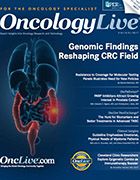Publication
Article
Oncology Live®
Cleveland Clinic Researchers Explore Epigenetic Combo as Immunotherapy Booster
Author(s):
An epigenetic strategy under study at Cleveland Clinic combines THU, a cytidine deaminase inhibitor, with decitabine and nivolumab (Opdivo) in patients with non-small cell lung cancer. The results of early studies demonstrate that THU may help prime the immune system.
Vamsidhar Velcheti,
MD, FACP
Staff Physician and Associate Director
Center for Immuno-Oncology Research
Despite decades of efforts to improve cytotoxic chemotherapy combinations for patients with lung cancer, we have made very modest improvements in outcomes and the malignancy remains a leading cause of cancer-related death worldwide. Recent advances in immunotherapies that use agents to circumvent critical tumor immune evasive pathways, such as PD-1/PD-L1, have shown promise. Three drugs targeting these pathways are now approved by the FDA for use in patients with non—small cell lung cancer (NSCLC): nivolumab (Opdivo), pembrolizumab (Keytruda), and atezolizumab (Tecentriq). However, most patients with NSCLC who are treated with immunotherapy do not respond to these therapies.
Biological Barriers to Response
At Cleveland Clinic, we are investigating novel treatment options for patients with lung cancer that can increase the likelihood of a response to immunotherapy. This research is funded in part by the Conquer Cancer Foundation of the American Society of Clinical Oncology and the National Cancer Institute. If successful, these efforts will lead to novel strategies that enhance endogenous antitumor immune responses and improve the efficacy of immune checkpoint inhibitors in lung cancer.One of the key reasons that patients with lung cancers are not able to mount an adequate spontaneous immune response against their cancer is because of the suppression of critical proteins in the tumor that help the immune system recognize tumor cells. This complex orchestration of critical proteins in the tumor results in loss of expression of neoantigens, or nonself proteins, needed for immune recognition of the tumors. For example, some tumor-specific antigens, such as cancertestis family antigens, can induce immune responses. These antigens and the antigen presentation mechanisms are often epigenetically silenced in lung cancer. This suppression allows the tumors to be invisible to the immune system, thereby making immunotherapy ineffective.
Enhancing Chemotherapy
The DNA methyl-transferase 1 (DNMT1) enzyme is a critical mediator of such epigenetic silencing. In addition, DNMT1 mediates the epigenetic repression of hundreds of late-differentiation genes in tumor cells. These genes inhibit the MYC function and terminate cell growth and proliferation independent of p53. Thus, DNMT1 is a valid molecular target, and inhibiting DNMT1 can allow termination of cancer cell proliferation by mechanisms independent of p53 and induce expression of tumor-specific antigens.Decitabine, which depletes DNMT1, is FDA approved to treat myeloid cancers. Decitabine, however, is rapidly eliminated in solid organs by the cytidine deaminase (CDA) enzyme, and thus, the decitabine distribution into solid tissues is trivial, which severely limits the potential of decitabine as an effective lung cancer treatment. This basic pharmacologic limitation cannot be overcome by increasing the dose or by using a continuous infusion because both methods increase the concentration of decitabine in sensitive tissues (eg, bone marrow) to toxic levels, while target solid tissues still receive inadequate exposure.
This limitation can be overcome by combining decitabine with tetrahydrouridine (THU), an inhibitor of CDA. In a preclinical study in murine models, the combination boosted levels of CD8-positive lymphocytes and other immune-priming biomarkers.1
Further, in a phase I clinical trial, the addition of THU prolonged the half-life of decitabine from a few minutes to many hours. With such improved bioavailability and with the low Cmax and extended Tmax through solid tissues, this novel combination can provide noncytotoxic epigenetic treatment of solid tumor malignancies.
In collaboration with investigators at the National Institutes of Health, researchers at Cleveland Clinic will be studying this novel pharmacologic approach in the randomized phase II PRECISE trial (NCT02664181).2 The study aims to enroll 60 patients with NSCLC that has progressed after at least 1 prior systemic treatment or targeted therapy, if appropriate. In the experimental arm, patients will receive oral THU at approximately 10 mg/kg followed by oral decitabine at about 0.2 mg/kg plus intravenous nivolumab at 3 mg/kg every 2 weeks until progression. In the comparator arm, nivolumab will be administered at 3 mg/kg every 2 weeks until progression, which is the standard of care for patients with NSCLC who have progressed after receiving chemotherapy. The primary endpoints are objective response and overall response rates.
This multi-institutional clinical trial, which is expected to start enrollment in June, has the potential to help many patients and improve outcomes from treatment with immunotherapy.
References
- Kang K, Rakshit S, Schalper A, et al. Pre-clinical proof of principle of pharmacologically rational non-cytotoxic epigenetic-immunotherapy to treat lung cancer. J Clin Oncol. 2016;34(suppl;abstr e14073). meetinglibrary.asco.org/content/170714-176.
- National Institutes of Health Clinical Trials Registry. Pharmacologically rational epigenetic immunotherapy for second line therapy in patients with non-small cell lung cancer (PRECISE). ClinicalTrials.gov website. Identifier: NCT02664181. Updated March 31, 2107. Accessed May 5, 2017.






%20(2)%201-Recovered-Recovered-Recovered-Recovered-Recovered.jpg?fit=crop&auto=format)

%20(2)%201-Recovered-Recovered-Recovered-Recovered-Recovered.jpg?fit=crop&auto=format)
%20(2)%201-Recovered-Recovered-Recovered-Recovered-Recovered.jpg?fit=crop&auto=format)